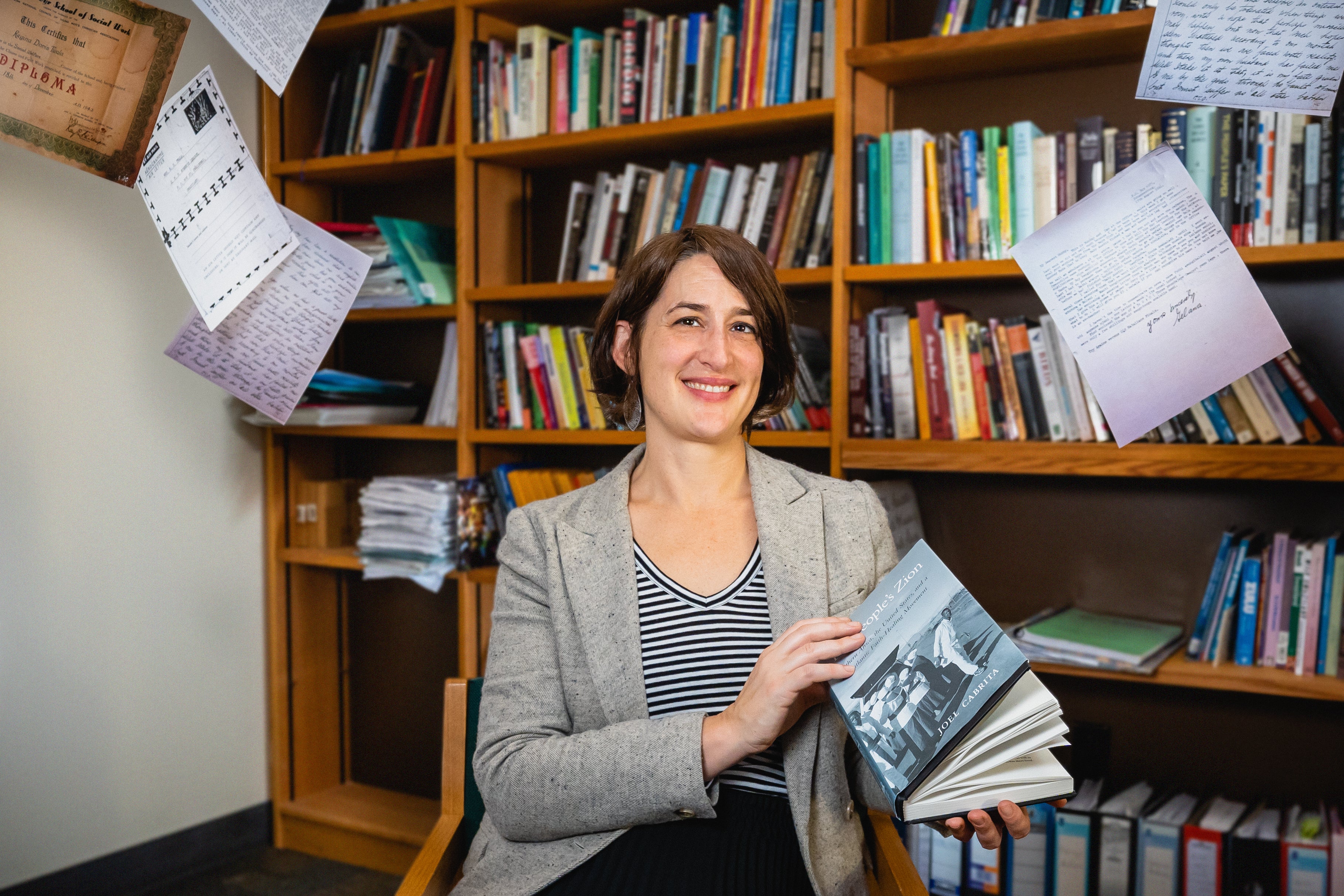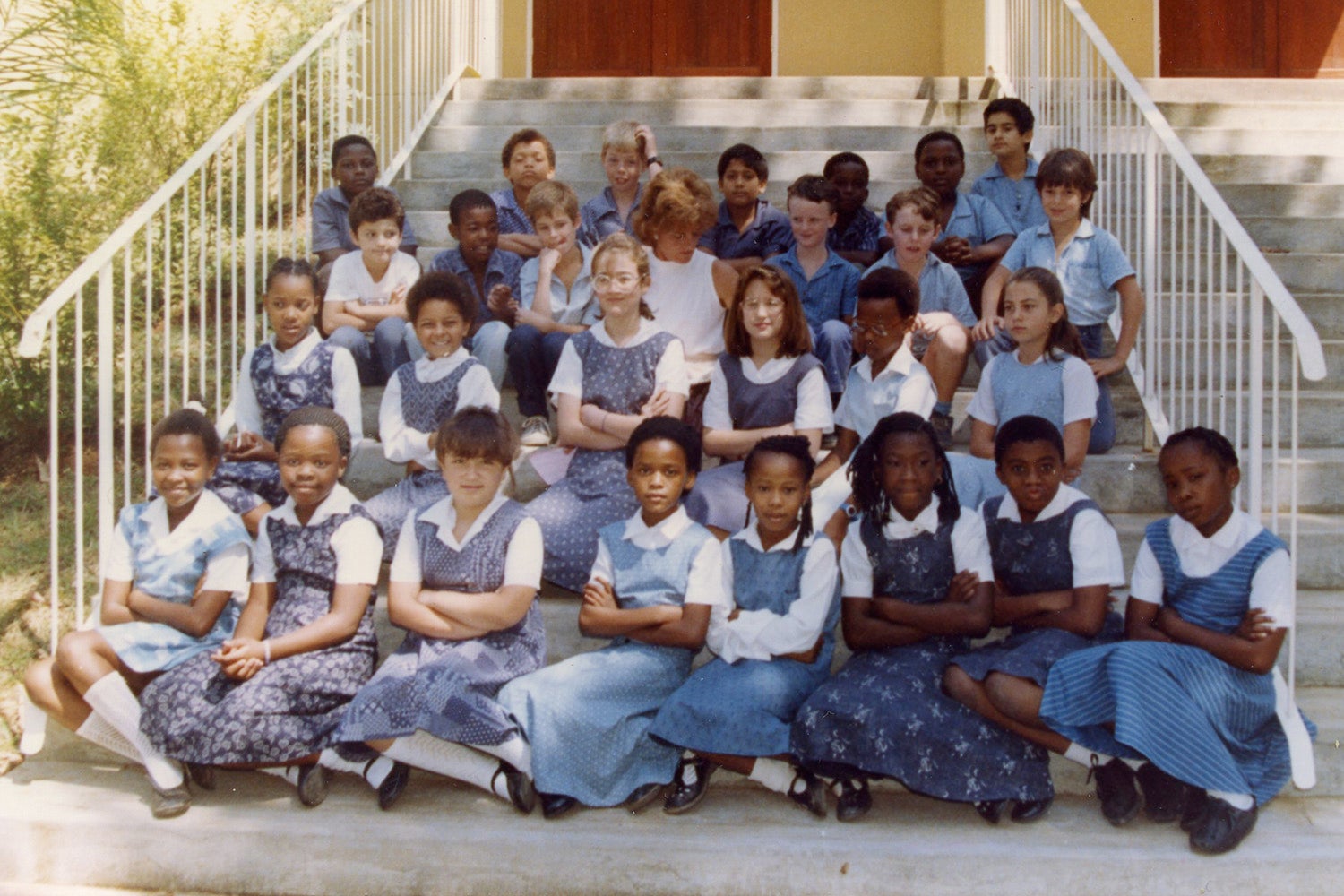Stanford historian’s Southern African childhood spurred lifelong study of the region’s religions and people
Joel Cabrita’s research explores the politics of memory and the question of who gets remembered and who gets forgotten by history. It’s a theme that has captivated her since childhood.
Stanford historian Joel Cabrita traces her lifelong passion for examining and better understanding voices from Southern Africa to a childhood spent listening to the rhythmic songs and prayers of her religious neighbors.

Stanford historian Joel Cabrita holds up her book about the Southern African Zionist church movement. She is surrounded by documents she drew upon for her new book about the historical figure Regina Twala. (Image credit: Farrin Abbott)
Cabrita grew up in Eswatini (formerly known as Swaziland) in Southern Africa and is the child of an Afrikaner mother from South Africa and a father of Portuguese descent from Mozambique.
“My history, for better or worse, is that of white settler communities in Southern Africa,” said Cabrita, an assistant professor of history in the School of Humanities and Sciences. “The white experience is that you’re often very ignorant of black lives, and you can have very little understanding of people who live next to you. From an early age, I didn’t like that and wanted to find a more thoughtful way to engage.”
When a high school teacher assigned a research paper, Cabrita found her chance. She opted to investigate the African Zionist church movement, which blends traditional African beliefs with evangelical Christian practices, including faith-healing. The movement, which is unrelated to the Jewish political movement known as Zionism, includes over 15 million mostly black congregants across Southern Africa. Cabrita often saw throngs of worshipers – visually distinctive in white smocks with bright green or blue sashes – heading home on Sunday mornings after spending all night praying, singing, healing, and dancing. She often noticed Zionists, seated or kneeling on mats, within the whitewashed stone circles that marked their worship sites on the mountainside near her home.

A young Joel Cabrita (second row from bottom, third from the right) with her fourth-grade class in Eswatini in 1989. (Image credit: Courtesy Joel Cabrita)
“Swaziland was very rural when I was growing up there,” said Cabrita, whose slight English accent is only sometimes noticeable. “When we would play in the river, we often were sharing it with people being baptized. Congregants stood on the bank singing. It was both a striking experience and quite normal to us – both familiar and strange. This was as close to a national movement as it could be, but no one could tell me much about it.”
After attending a worship session, Cabrita continued to learn more about this religious movement that was so prevalent in Southern Africa and yet virtually unheard of by the outside world. That initial interest later led her to study religion as an undergraduate and to write her doctoral thesis at the University of Cambridge about the broader Zionist movement, which originated in Australia, spread to the United States and found its largest constituency in Africa.
She explains that many working-class people found comfort in the movement’s teaching – that ordinary people could access dramatic healing powers through prayerful reliance on God. This notion proved empowering for the millions of people who followed Zionist teachings.
Telling a more inclusive story
While researching the white European Zionist movement scholar Bengt Sundkler, Cabrita became increasingly aware that it wasn’t just the religious movement that had escaped notice outside Africa – voices of some prominent Africans were also largely missing. For example, she came across notes from someone named R. Twala, who appeared to be a very prolific and educated African research assistant. Intrigued by the quality of Twala’s writing, Cabrita began making inquiries when she was in Eswatini. Her sleuthing paid off when the mother of a friend recognized the signature as that of Regina Gelana Twala, a pioneering African feminist, Christian Pentecostal pioneer and liberation leader.
“I realized this was an extraordinary woman in history,” Cabrita said. “She was the first black woman to get a degree from the University of the Witwatersrand, the main university in Johannesburg, in 1948. She wanted to be a writer and wrote under pseudonyms. She did contemporary research on women and co-founded the Swaziland Progressive Party. She also founded a library for women, so female schoolchildren could just come and read and they didn’t have to rush home and do work at the house.”
After discovering other writings by Twala, who died in 1968, including a trove of letters between her and her husband, several full-length manuscripts and a collection of newspaper columns, Cabrita decided to write Twala’s biography, now under contract with Ohio University Press. “I have been given access to 30-plus years of correspondence,” said Cabrita, who is in close contact with Twala’s family. “It’s a unique archive – both personal and political. She and her husband were close friends of Nelson and Winnie Mandela. So there are mentions of big events and famous people and a record of black politics in this era, but also a record of intimate family life.”
Twala’s story, and her obscurity, appealed to Cabrita, who began her career asking questions about why important religious movements and people in Southern Africa were not better known outside the region.
“There’s a politics of memory and a politics of biography,” she said. “I think African history is dominated by this canon of big men and Twala has been written out of the canon because of her gender and also partly because of her politics. There’s a process of public memory, who gets remembered and who gets forgotten.”
Now Cabrita is focused on ways to identify and share the voices of those who were left out of the African narrative. She plans to start by creating a digital archive of black African women writers, starting with Twala and building the archive over time. “It can be challenging for some audiences in Africa to access expensive books, so I want to create a website,” she said. “Some works could be read out loud as an ongoing radio show. It would be a way the authorial voice can be retrieved.”
By including lesser-known voices, Cabrita hopes to weave a broader and more inclusive story about the place she once called home. “There’s a very biographical component for me,” she said. “It’s a consequence of being born in that part of the world.”
Stanford Report is exploring the stories behind the curiosity and excitement that drives foundational discoveries in the arts, humanities, social sciences and sciences.
